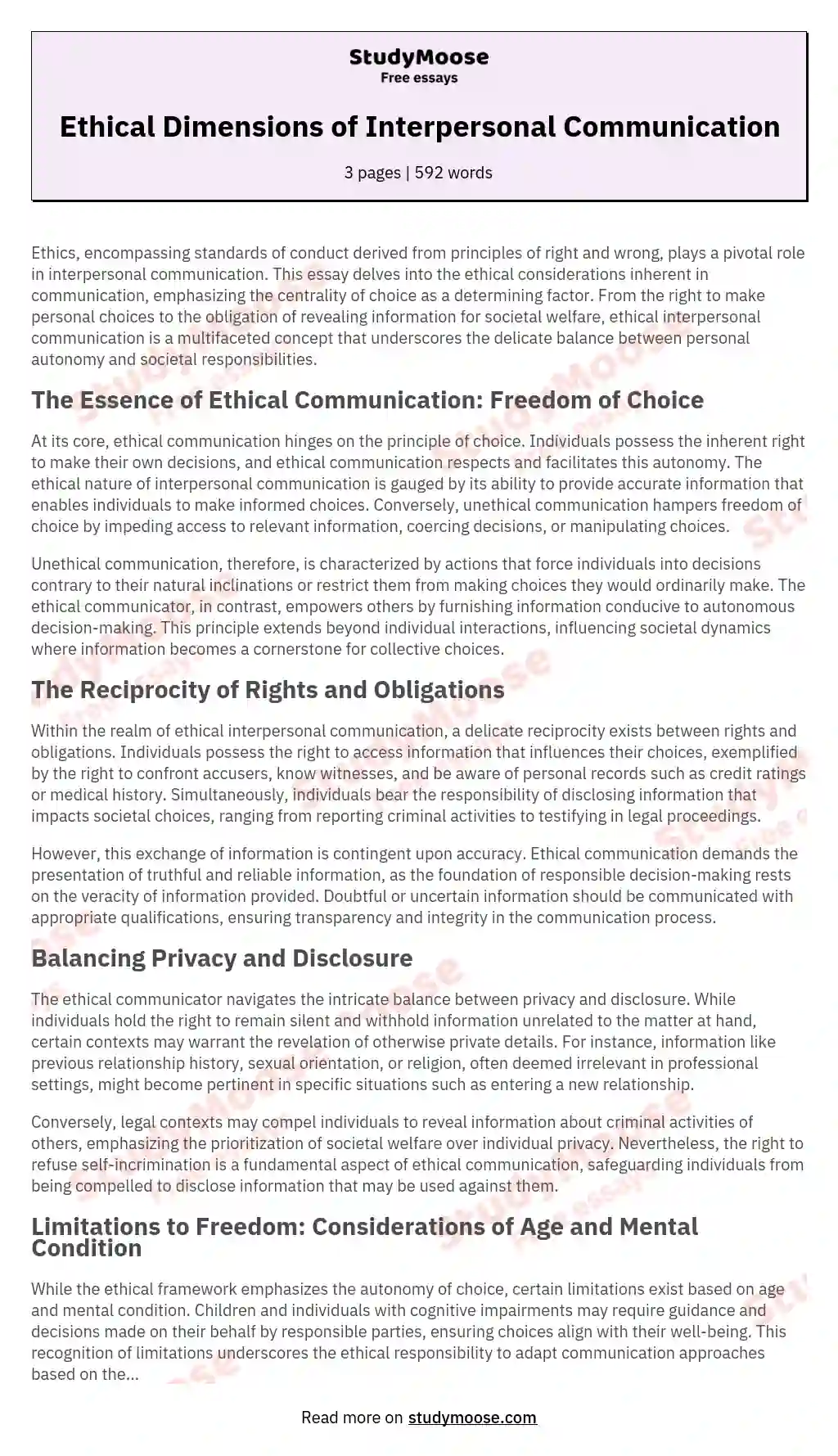Interpersonal communication is the process of exchanging information, feelings, and meaning through verbal and nonverbal messages between two or more people. It is an essential skill that plays a crucial role in our personal and professional lives. Studying interpersonal communication can help us understand and improve the way we communicate with others, build and maintain relationships, and resolve conflicts effectively.
One of the main reasons to study interpersonal communication is to improve our communication skills. Effective communication is a vital component of successful relationships, whether they are personal or professional. It enables us to convey our thoughts, ideas, and feelings effectively, as well as to listen and understand the perspectives of others. By studying interpersonal communication, we can learn how to effectively communicate in different situations and with different people, such as friends, family, colleagues, or clients. We can also learn how to manage communication barriers, such as misunderstandings, cultural differences, or conflicts, and find ways to resolve them.
Another reason to study interpersonal communication is to build and maintain strong relationships. Relationships are a fundamental part of our lives and play a crucial role in our well-being and happiness. Interpersonal communication is the foundation of any relationship, as it allows us to connect with others and create a sense of trust, understanding, and intimacy. By studying interpersonal communication, we can learn how to develop and strengthen our relationships with others, as well as how to manage conflicts and resolve issues that may arise. We can also learn how to communicate effectively in different types of relationships, such as romantic, platonic, or professional, and how to adapt our communication style to different personalities and situations.
Finally, studying interpersonal communication can help us resolve conflicts effectively. Conflicts are a natural part of any relationship and can arise due to misunderstandings, miscommunication, or different perspectives. Interpersonal communication can help us navigate conflicts and find mutually beneficial solutions that take into account the needs and perspectives of all parties involved. By studying interpersonal communication, we can learn how to communicate assertively and express our needs and boundaries, as well as how to listen and understand the perspectives of others. We can also learn how to use effective conflict resolution strategies, such as compromise, negotiation, or mediation, to resolve conflicts in a constructive and respectful way.
In conclusion, studying interpersonal communication is essential to improve our communication skills, build and maintain strong relationships, and resolve conflicts effectively. It is a valuable skill that can benefit us in all aspects of our lives and help us navigate the complexities of human interactions.
6.1 Principles of Interpersonal Communication

In other words, people who encounter negative experiences, but are also willing to communicate those experiences, are more likely to have better mental and physical health. Physical Needs Communication is vital to our physical needs. When I studied abroad in Sweden, my parents and I talked on the phone at the same time every Sunday, which established a comfortable routine for us. Most people do not realize the value and importance of communication. Third, by being open with others and sharing your views and feelings you will get a validation to your disclosures. What motivated you or the other person to initiate the talk? However, not all verbal, nonverbal, and written communication is interpersonal.
Why Interpersonal Communication Is Important

For example, Haley, the oldest daughter in the television show Modern Family, often presents herself as incapable in order to get her parents to do her work. Interpersonal communication is an important day-to-day life skill that many people may go their entire life without formally learning about. Teamwork In life, you will rarely deal with situations alone. We need to be able to study communication because we spend so much time doing it, we could learn to be more effective at it, and it is something we have done for a long time. Because skillful communication depends on the context, communication researchers call learning skills communication competence. Just like a schematic or diagram for assembling a new computer desk helps you put it together, relationship schemata guide us in how we believe our interpersonal relationships should work and how to create them. Just as large groups of people create cultures through shared symbols language , values, and rituals, people in relationships also create cultures at a smaller level.
Importance of Interpersonal Communication

Just as many companies, celebrities, and politicians create a public image, we desire to present different faces in different contexts. With the guidance of my faculty collaborators, I have learned to employ a variety of research methods, such as experiments and surveys, to understand cognitions related to romantic relationships and fundamental interpersonal processes. There have been documented cases of abandoned or neglected children, sometimes referred to as feral children, who survived using their animalistic instincts but suffered psychological and physical trauma as a result of their isolation Candland, 1995. For example, have you ever wanted to stay in and order a pizza and watch a movie, but your friend suggests that you go to a local restaurant and then to the theatre? What motivates you to communicate with someone?. Nor would you trust a compulsive liar if they Be a Role Model Most people are followers. These relationships occur in academic, professional, personal, and civic contexts, and improving our interpersonal communication competence can also improve our physical and psychological health, enhance our relationships, and make us more successful in our careers.







